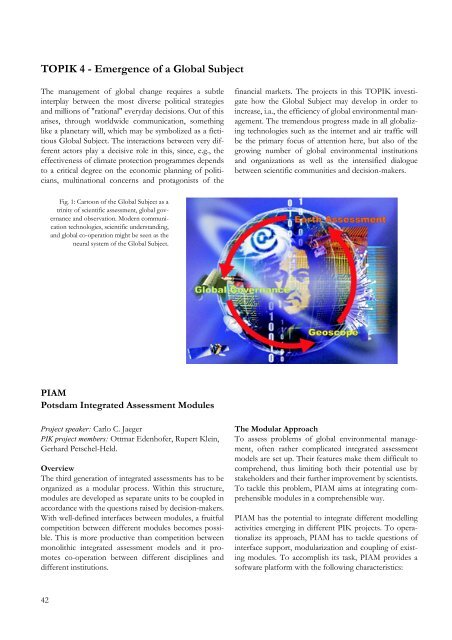PIK Biennial Report 2000-2001 - Potsdam Institute for Climate ...
PIK Biennial Report 2000-2001 - Potsdam Institute for Climate ...
PIK Biennial Report 2000-2001 - Potsdam Institute for Climate ...
Create successful ePaper yourself
Turn your PDF publications into a flip-book with our unique Google optimized e-Paper software.
TO<strong>PIK</strong> 4 - Emergence of a Global Subject<br />
The management of global change requires a subtle<br />
interplay between the most diverse political strategies<br />
and millions of "rational" everyday decisions. Out of this<br />
arises, through worldwide communication, something<br />
like a planetary will, which may be symbolized as a fictitious<br />
Global Subject. The interactions between very different<br />
actors play a decisive role in this, since, e.g., the<br />
effectiveness of climate protection programmes depends<br />
to a critical degree on the economic planning of politicians,<br />
multinational concerns and protagonists of the<br />
42<br />
Fig. 1: Cartoon of the Global Subject as a<br />
trinity of scientific assessment, global governance<br />
and observation. Modern communication<br />
technologies, scientific understanding,<br />
and global co-operation might be seen as the<br />
neural system of the Global Subject.<br />
PIAM<br />
<strong>Potsdam</strong> Integrated Assessment Modules<br />
Project speaker: Carlo C. Jaeger<br />
<strong>PIK</strong> project members: Ottmar Edenhofer, Rupert Klein,<br />
Gerhard Petschel-Held.<br />
Overview<br />
The third generation of integrated assessments has to be<br />
organized as a modular process. Within this structure,<br />
modules are developed as separate units to be coupled in<br />
accordance with the questions raised by decision-makers.<br />
With well-defined interfaces between modules, a fruitful<br />
competition between different modules becomes possible.<br />
This is more productive than competition between<br />
monolithic integrated assessment models and it promotes<br />
co-operation between different disciplines and<br />
different institutions.<br />
financial markets. The projects in this TO<strong>PIK</strong> investigate<br />
how the Global Subject may develop in order to<br />
increase, i.a., the efficiency of global environmental management.<br />
The tremendous progress made in all globalizing<br />
technologies such as the internet and air traffic will<br />
be the primary focus of attention here, but also of the<br />
growing number of global environmental institutions<br />
and organizations as well as the intensified dialogue<br />
between scientific communities and decision-makers.<br />
The Modular Approach<br />
To assess problems of global environmental management,<br />
often rather complicated integrated assessment<br />
models are set up. Their features make them difficult to<br />
comprehend, thus limiting both their potential use by<br />
stakeholders and their further improvement by scientists.<br />
To tackle this problem, PIAM aims at integrating comprehensible<br />
modules in a comprehensible way.<br />
PIAM has the potential to integrate different modelling<br />
activities emerging in different <strong>PIK</strong> projects. To operationalize<br />
its approach, PIAM has to tackle questions of<br />
interface support, modularization and coupling of existing<br />
modules. To accomplish its task, PIAM provides a<br />
software plat<strong>for</strong>m with the following characteristics:

















